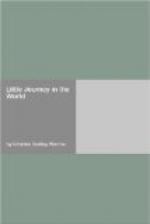“Not if you win,” said Carmen, softly. “The public won’t care for the remark unless you fail.”
“And he tried to prejudice the Court by quoting the remark attributed to Uncle Jerry, ‘The public be d—–d’ as if, said Mansfield, the public has no rights as—against the railroad wreckers. Uncle Jerry laughed, and interrupted: ‘That’s nonsense, reporters’ nonsense. What I said was that if the public thought I was fool enough to make it our enemy, the public might be d—–d (begging your honor’s pardon).’ Then everybody laughed. ’It’s the bond holders, who want big dividends, that stand in the way of the development of the country, that’s what it is,’ said he, as he sat down, to those around him, but loud enough to be heard all over the room. Mansfield asked the protection of the Court against these clap-trap interruptions. The judge said it was altogether irregular, and Uncle Jerry begged pardon. The reporters made this incident the one prominent thing in the case that day.”
“What a delightful Uncle Jerry it is!” said Carmen. “You’d better keep an eye on him, Rodney; he’ll be giving your money to that theological seminary in Alabama.”
“That reminds me,” Henderson said, cooling down, “of a paragraph in The Planet, the other day, about the amount of my gifts unknown to the public. I showed it to Uncle Jerry, and he said, ’Yes, I mentioned it to the editor; such things don’t do any harm.’”
“I saw it, and wondered who started it,” Carmen replied, wrinkling her brows as if she had been a good deal perplexed about it.
“I thought,” said Henderson, with a smile, “that it ought to be explained to you.”
“No,” she said, reflectively; “you are liberal enough, goodness knows —too liberal—but you are not a flat.”
Henderson was in the habit of dropping in at the Eschelles’ occasionally, when he wanted to talk freely. He had no need to wear a mask with Carmen. Her moral sense was tolerant and elastic, and feminine sympathy of this sort is a grateful cushion. She admired Henderson, without thinking any too well of the world in general, and she admired him for the qualities that were most conformable to his inclination. It was no case of hero-worship, to be sure, nor for tragedy; but then what a satisfaction it must be to sweet Lady Macbeth, coiled up on her sofa, to feel that the thane of Cawdor has some nerve!
The Hendersons had come back to Washington Square late in the autumn. It is a merciful provision that one has an orderly and well-appointed home to return to from the fatigues of the country. Margaret, at any rate, was a little tired with the multiform excitements of her summer, and experienced a feeling of relief when she crossed her own threshold and entered into the freedom and quiet of her home. She was able to shut the door there even against the solicitations of nature and against the weariness of it also. How quiet it was in the square in those late autumn




